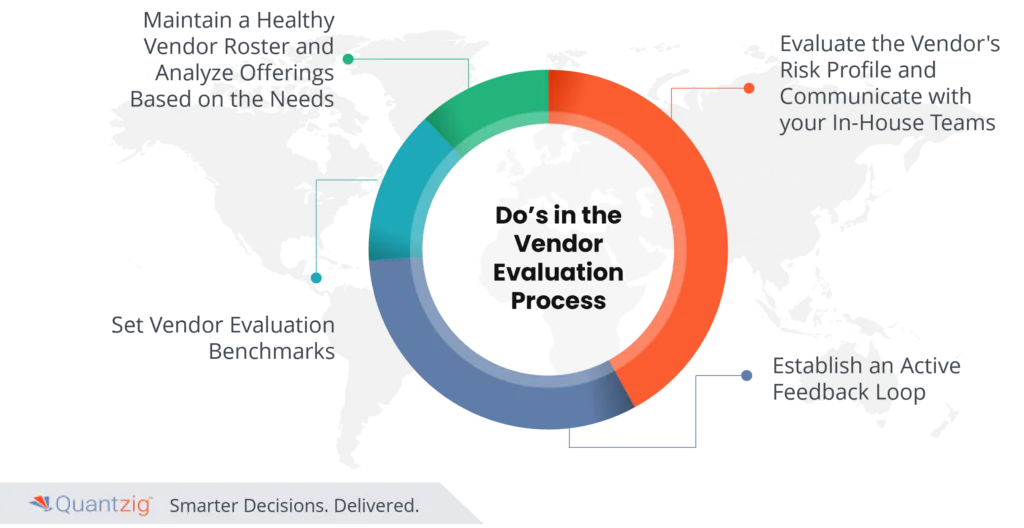Table of Contents
Introduction to Process of Vendor Evaluation
As the name suggests, vendor evaluation is a basic process of evaluating new and old vendors using a quantifiable approach. It holds a top spot in the agenda of every business irrespective of its sector since businesses have a huge portfolio of suppliers, and it’s essential to gauge their performance based on factors like contract compliance, cost reduction, and risk management.
To make vendor evaluation a cakewalk for our clients, we have developed easy to follow steps to create and establish a vendor evaluation framework.
Book a demo to experience the meaningful insights we derive from data through our analytical tools and platform capabilities. Schedule a demo today!
Request a Free DemoUnderstanding the Vendor Evaluation Process: What is it?
The vendor evaluation process is vital for enterprise risk management and procurement. This structured approach ensures thorough scrutiny of vendors, fostering robust risk management practices. By using a vendor assessment framework and criteria checklist, organizations can evaluate vendor performance, mitigate risks, and optimize efficiency. This process supports supplier assessments and comprehensive evaluations, maintaining high standards. Ultimately, vendor performance evaluation is crucial for informed decision-making and long-term partnerships, safeguarding organizational integrity and enhancing procurement practices in a dynamic business environment.
How to Evaluate Vendor Selection
Evaluating vendors involves a strategic approach to align suppliers with organizational objectives. Key stages include defining objectives, pre-screening vendors, developing evaluation criteria, shortlisting candidates, issuing RFPs or RFQs, analyzing proposals, conducting site visits and audits, checking references, making final selections, and negotiating contracts. Continuous performance monitoring ensures vendors consistently meet expectations. This dynamic process adapts to changing business landscapes, fostering successful partnerships.
Importance and Criteria for Vendor Assessment
Vendor evaluation is essential for a resilient supply chain. It mitigates risks, enhances operational efficiency, builds long-term partnerships, and ensures compliance with regulations and ethical standards. Key criteria include financial stability, product quality, delivery performance, compliance, reputation, innovation, risk management, and cost competitiveness. A well-executed evaluation process aligns with organizational goals and ensures supply chain success.
What Is the Do’s in the Vendor Evaluation Process?
The vendor evaluation process is crucial in enterprise risk management (ERM) and procurement, serving as a cornerstone for vendor and supplier assessment. By meticulously scrutinizing vendors through a robust vendor assessment framework, organizations mitigate risks, ensure compliance, and uphold high standards. Structured criteria checklists and templates guide evaluations, enhancing operational efficiency and safeguarding project management endeavors.
Vendor evaluation is not merely routine but a strategic imperative that underpins sound procurement practices and fosters enduring partnerships.
- Maintain a Healthy Vendor Roster: Categorize vendors based on their offerings to distinguish them effectively.
- Analyze Offerings Based on Needs: Understand vendor capabilities to identify those best suited to your enterprise’s requirements.
- Evaluate the Vendor’s Risk Profile: Conduct periodic reviews, onsite visits, and audits to assess data security and risk management.
- Communicate with In-House Teams: Regularly inform executives about the importance of vendor relationships and support efforts.
- Set Vendor Evaluation Benchmarks: Establish performance thresholds and conduct evaluations based on previously set goals.
- Establish an Active Feedback Loop: Create a feedback loop to monitor and improve vendor performance continually.
Experience the advantages firsthand by testing a customized complimentary pilot designed to address your specific requirements. Pilot studies are non-committal in nature.
Request a free pilotWhat Is the Don’ts in the Vendor Evaluation Process?
- Vaguely Formulated Requirements: Unclear requirements lead to vendor responses based on assumptions, complicating the evaluation process.
- Communication Indiscretion: Sharing competitor pricing with other vendors can provoke conflict and harm your credibility.
- Disregarding Proof of Concept: Gauging a vendor’s capability only from their proposal, without analyzing their proof of concept, is a common mistake.
Setting clear standards for vendor evaluation benefits both your organization and the vendors, fostering stronger relationships. Businesses should also monitor market trends and periodically review the vendor landscape to find new, compliant vendors.
Get started with your complimentary trial today and delve into our platform without any obligations. Explore our wide range of customized, consumption driven analytical solutions services built across the analytical maturity levels.
Start your free trialConclusion
In conclusion, vendor evaluation is a fundamental process for businesses seeking to optimize their operations and ensure the resilience of their supply chain. By implementing a structured vendor evaluation framework and adhering to a comprehensive set of criteria, organizations can strategically select vendors that align with their goals, mitigate risks, and drive operational efficiency. The importance of vendor evaluation is underscored by its role in fostering long-term partnerships, adapting to evolving business needs, and ensuring compliance with regulatory requirements and ethical standards. While the vendor evaluation process presents challenges, such as the need for clear requirements, effective communication, and thorough analysis, adhering to best practices and avoiding common pitfalls can lead to successful outcomes. Ultimately, by prioritizing vendor evaluation and continuously monitoring the vendor landscape, businesses can strengthen their relationships with vendors, enhance supply chain resilience, and achieve sustainable growth in an ever-evolving marketplace.







